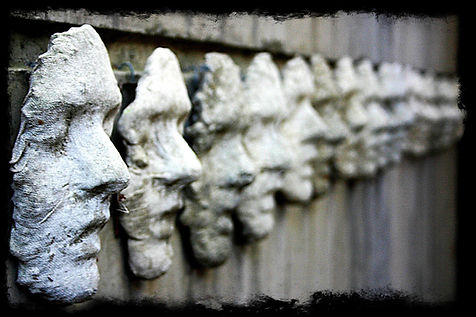
Dramatherapy
- When Words Are Not Enough -
"Dramatherapy has as its main focus the intentional use of healing aspects of drama and theatre as the therapeutic process. It is a method of working and playing that uses action methods to facilitate creativity, imagination, learning, insight and growth."
British Association of Dramatherapists
"Dramatherapy is a unique form of psychotherapy in which creativity, play, movement, voice, storytelling, dramatisation, and the performance arts have a central position within the therapeutic relationship"
Health & Care Professions Council
"Drama Therapy is an active, experiential approach to facilitating change. Through storytelling, projective play, purposeful improvisation, and performance, participants are invited to rehearse desired behaviors, practice being in relationship, expand and find flexibility between life roles, and perform the change they wish to be and see in the world."
Above: A demonstration of group dramatherapy with survivors of conflict trauma in Palestine from The Freedom Theatre.

Dramatherapy...
-
is a form of psychological therapy in which all aspects of the arts are utilised.
-
is a method of engaging clients in psychological, emotional, behavioural and social change.
-
gives equal validity to body and mind within therapy.
-
uses storytelling, myths, play-texts, puppetry, masks, improvisation, role play, mime, dance, movement and many other tools.
-
also uses painting, sculpting, music, singing, visualisation, sandplay, ritual, ceremony and play.
-
All of these tools can help you to creatively express yourself in a safe and supportive environment
The practical and theoretical basis of dramatherapy takes its inspiration as much from the major movements in drama and theatre as it does from the most important developments in psychology.
A dramatherapist is likely to be influenced just as much by Stanislavski, Brecht, Grotowski and Artaud in the theatre world as they are by the likes of Freud, Jung, Winnicott and Klein in the world of psychology.
What makes dramatherapy unique is the idea that by exploring a metaphor through action, with depth and intention, that symbolic act can make very real changes and bring about profound insight. Whether through the metaphor expressed in a myth or a fairytale, the metaphor portrayed in a sandtray image, or the metaphor contained in an abstract movement or dramatic improvisation - all of these examples and more can be the vehicle through which meaningful therapeutic change takes place.
Core Principles
The idea that actions can speak louder than words is at the heart of this practice. Action can imply a multitude of different things but at its heart must be ‘a thing done’. The ancient Greeks called this drama, and with the principle intention of healing, we have come to define a very broad array of action based therapeutic techniques as Dramatherapy. Throughout times of stress, emotional upheaval, disability and mental illness, various action methods can be intentionally employed to seek a therapeutic outcome.
The intention to bring about positive change is key in distinguishing dramatherapy from other dramatic processes such as theatre . Many techniques in dramatherapy are derived from theatre, such as role play, mime, puppetry, mask work, dance & movement, improvisation and storytelling. However, there are also methods used that are adopted from other backgrounds like painting, sculpting, music, singing, visualisation, ritual and play. These are but a few of the many practices that can be found in a dramatherapy session. This variety of techniques helps to balance the validity of both body and mind.
Dramatic Play
Dramatic play can be a safe and enriching way for you to explore your feelings, loosen both emotional and physical tensions and develop an open spontaneity which can be deeply therapeutic. It is an effective way of cultivating a trusting environment in which creative risk-taking can happen. It is a method of interaction that is applicable in any setting as it can be shaped to meet the needs of different age-groups, cultures and people of differing physical and/or mental needs.
Simple playful interactions and games can be an important part of dramatherapy and develop into other dramatic activities. Expressive movement, story-telling, working from scripts and mask-making are all examples of activities that begin in play and help you to achieve personal change, self-acceptance, alleviation of symptoms and integration of traumas.

Dramatherapy is underpinned by a broad framework of psychological and psychotherapeutic methods. Within this framework, the Arts are applied to support you in making psychological, emotional and social changes. This indirect approach allows you to explore things that might otherwise be too traumatic in a far safer and more approachable way.
There is absolutely no need for anybody participating in dramatherapy to have any prior experience of drama, or any of the arts. The work is always aimed at a level that feels safe and accessible for you. It is your needs that are at the centre of every session.
Please follow the links below for information about national and
international dramatherapy organsiations.







